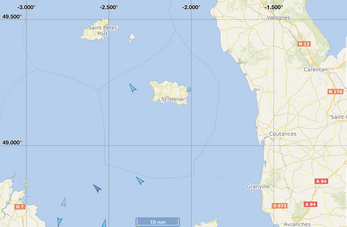VMS
On the 6th of May 2021, between 50 and 60 French fishing boats created a blockade of Jersey’s St. Helier harbour. Their protest was due to the dispute surrounding fishing rights off the coast of Jersey following the UK’s exit from the EU, which has dramatically reduced the area in which French fishermen are now allowed to operate.
Jersey’s deep waters are rich and diverse in fish. The area up to 3 nautical miles off its coast has historically been governed by the island, with the area between 3 and 12 miles from the coast being shared and governed equally between Jersey and France since the Granville Bay agreement in 2000. As of February 2020, 392 French boats had permits to fish under the terms of the agreement, relying on the shared zone heavily. Two-thirds of the shellfish consumed in France comes from the Normandy fishing fleet, which supports 4,000 jobs.
The EU–UK Trade and Cooperation Agreement was signed by the EU and UK on 30 December 2020, leading to Jersey taking sole responsibility for managing its territorial waters. The agreement stated that
"each Party shall grant vessels of the other Party access to fish in its waters reflecting the actual extent and nature of fishing activity that it can be demonstrated was carried out…"
Meaning that, in order for French boats to continue to fish in Jersey’s waters, they had to prove that they had been doing so historically. Evidence had to be supplied by a Vessel Monitoring System (VMS) and on 29 September 2021, the Jersey government issued a total of 142 fishing permits, but stated they had rejected permits for 75 French vessel citing that they "they do not meet the criteria and have either not fished in Jersey waters during the relevant period or have not been able to evidence their activity”.
The data provided by the Vessel Monitoring System has been put in a position of power, dictating which boats receive permits to fish in Jersey’s waters and has resulted in the livelihood of these fishermen depending on the sensory information provided by this technology. This information, however, can be easily falsified and cannot provide an accurate representation of what occurs at sea. This alien landscape is the battleground of sensitive and complicated connections which can only be understood by the fishermen who inhabit it, yet their terms are being dictated from the land by governments based on the VMS information provided.
This project deals with complicated issues of proximity, sensing, communication, identity, borders and evidence through the playful media device of the video game, emphasising the almost farcical nature of the existing situation and exaggerating certain relationships between identities, borders and evidence.
| Status | In development |
| Platforms | HTML5 |
| Author | grantdonaldson |
| Genre | Platformer |
| Made with | Unity |
